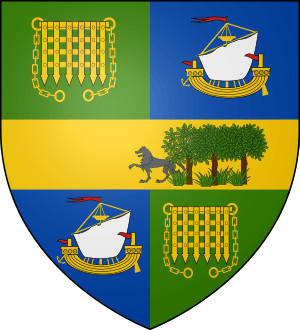James Callaghan facts for kids
Quick facts for kids
The Lord Callaghan of Cardiff
|
|||||||||||||||||||||||||||||||||||||||||||||
|---|---|---|---|---|---|---|---|---|---|---|---|---|---|---|---|---|---|---|---|---|---|---|---|---|---|---|---|---|---|---|---|---|---|---|---|---|---|---|---|---|---|---|---|---|---|
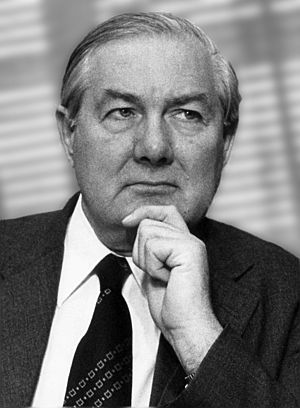
Callaghan in 1975
|
|||||||||||||||||||||||||||||||||||||||||||||
| Prime Minister of the United Kingdom | |||||||||||||||||||||||||||||||||||||||||||||
| In office 5 April 1976 – 4 May 1979 |
|||||||||||||||||||||||||||||||||||||||||||||
| Monarch | Elizabeth II | ||||||||||||||||||||||||||||||||||||||||||||
| Preceded by | Harold Wilson | ||||||||||||||||||||||||||||||||||||||||||||
| Succeeded by | Margaret Thatcher | ||||||||||||||||||||||||||||||||||||||||||||
| Leader of the Opposition | |||||||||||||||||||||||||||||||||||||||||||||
| In office 4 May 1979 – 10 November 1980 |
|||||||||||||||||||||||||||||||||||||||||||||
| Monarch | Elizabeth II | ||||||||||||||||||||||||||||||||||||||||||||
| Prime Minister | Margaret Thatcher | ||||||||||||||||||||||||||||||||||||||||||||
| Deputy | Michael Foot | ||||||||||||||||||||||||||||||||||||||||||||
| Preceded by | Margaret Thatcher | ||||||||||||||||||||||||||||||||||||||||||||
| Succeeded by | Michael Foot | ||||||||||||||||||||||||||||||||||||||||||||
| Leader of the Labour Party | |||||||||||||||||||||||||||||||||||||||||||||
| In office 5 April 1976 – 10 November 1980 |
|||||||||||||||||||||||||||||||||||||||||||||
| Deputy | Michael Foot | ||||||||||||||||||||||||||||||||||||||||||||
| Preceded by | Harold Wilson | ||||||||||||||||||||||||||||||||||||||||||||
| Succeeded by | Michael Foot | ||||||||||||||||||||||||||||||||||||||||||||
| Foreign Secretary | |||||||||||||||||||||||||||||||||||||||||||||
| In office 5 March 1974 – 8 April 1976 |
|||||||||||||||||||||||||||||||||||||||||||||
| Prime Minister | Harold Wilson | ||||||||||||||||||||||||||||||||||||||||||||
| Preceded by | Alec Douglas-Home | ||||||||||||||||||||||||||||||||||||||||||||
| Succeeded by | Anthony Crosland | ||||||||||||||||||||||||||||||||||||||||||||
| Home Secretary | |||||||||||||||||||||||||||||||||||||||||||||
| In office 30 November 1967 – 19 June 1970 |
|||||||||||||||||||||||||||||||||||||||||||||
| Prime Minister | Harold Wilson | ||||||||||||||||||||||||||||||||||||||||||||
| Preceded by | Roy Jenkins | ||||||||||||||||||||||||||||||||||||||||||||
| Succeeded by | Reginald Maudling | ||||||||||||||||||||||||||||||||||||||||||||
| Chancellor of the Exchequer | |||||||||||||||||||||||||||||||||||||||||||||
| In office 16 October 1964 – 30 November 1967 |
|||||||||||||||||||||||||||||||||||||||||||||
| Prime Minister | Harold Wilson | ||||||||||||||||||||||||||||||||||||||||||||
| Preceded by | Reginald Maudling | ||||||||||||||||||||||||||||||||||||||||||||
| Succeeded by | Roy Jenkins | ||||||||||||||||||||||||||||||||||||||||||||
|
|||||||||||||||||||||||||||||||||||||||||||||
|
|||||||||||||||||||||||||||||||||||||||||||||
|
|||||||||||||||||||||||||||||||||||||||||||||
| Personal details | |||||||||||||||||||||||||||||||||||||||||||||
| Born |
Leonard James Callaghan
27 March 1912 Portsmouth, England |
||||||||||||||||||||||||||||||||||||||||||||
| Died | 26 March 2005 (aged 92) Ringmer, East Sussex, England |
||||||||||||||||||||||||||||||||||||||||||||
| Political party | Labour | ||||||||||||||||||||||||||||||||||||||||||||
| Spouse |
Audrey Moulton
(m. 1938; died 2005) |
||||||||||||||||||||||||||||||||||||||||||||
| Children | 3, including Margaret Jay | ||||||||||||||||||||||||||||||||||||||||||||
| Signature | |||||||||||||||||||||||||||||||||||||||||||||
| Military service | |||||||||||||||||||||||||||||||||||||||||||||
| Branch/service | Royal Navy | ||||||||||||||||||||||||||||||||||||||||||||
| Rank | Lieutenant | ||||||||||||||||||||||||||||||||||||||||||||
Leonard James Callaghan, Baron Callaghan of Cardiff, KG, PC ( 27 March 1912 – 26 March 2005), commonly known as Jim Callaghan, was a British politician who served as Prime Minister of the United Kingdom from 1976 to 1979 and Leader of the Labour Party from 1976 to 1980. Callaghan is the only person to have held all four Great Offices of State, having served as Chancellor of the Exchequer from 1964 to 1967, Home Secretary from 1967 to 1970 and Foreign Secretary from 1974 to 1976. He was a member of Parliament (MP) from 1945 to 1987.
Born into a working class family in Portsmouth, Callaghan left school early and began his career as a tax inspector, before becoming a trade union official in the 1930s; he served as a lieutenant in the Royal Navy during the Second World War. He was elected to Parliament at the 1945 election, and was regarded as being on the left wing of the Labour Party. He was appointed to the Attlee government as a parliamentary secretary in 1947, and began to move increasingly towards the right wing of the Labour Party, while maintaining his reputation as a "Keeper of the Cloth Cap" – that is, seen as maintaining close ties between Labour and the trade unions. Following Labour's defeat at the 1951 election, Callaghan increasingly became regarded as the leader of the right wing of the Labour Party, and stood for the positions of deputy leader in 1960 and for leader in 1963, but was defeated by George Brown for the former and Harold Wilson for the latter.
Following Labour's victory at the 1964 election, Wilson appointed Callaghan as Chancellor of the Exchequer; this appointment coincided with a turbulent period for the British economy, during which Callaghan had to tackle both a chronic balance of payments deficit and various speculative attacks on the pound sterling, with its exchange rate to other currencies being fixed by the Bretton Woods system. On 18 November 1967, having initially denied that it would do so, the Government devalued the pound sterling. In the wake of the decision, Wilson moved Callaghan to the role of home secretary. During this time, Callaghan was responsible for overseeing the operations of the British Army to support the police in Northern Ireland, following a request from the Northern Ireland government. Callaghan remained in the Shadow Cabinet during Labour's period in Opposition from 1970 to 1974; upon Labour's victory at the 1974 election, Wilson appointed Callaghan as foreign secretary. Callaghan was responsible for renegotiating the terms of Britain's membership of the European Communities (EC), and strongly supported the "Yes" vote campaign in the 1975 referendum, which confirmed the UK's membership of the EC.
When Wilson suddenly announced his retirement in March 1976, Callaghan defeated five other candidates to be elected Leader of the Labour Party; he was appointed prime minister on 5 April 1976. Despite winning a narrow majority in the House of Commons at the 1974 election, Labour had lost this by the time Callaghan became prime minister, and several by-election defeats and defections in his early months forced Callaghan to strike a confidence and supply agreement with the Liberal Party. While this initially proved stable, in the wake of significant industrial disputes and widespread strikes in the 1978–79 "Winter of Discontent", and the defeat of the referendum on devolution for Scotland, led to minor parties joining the Conservatives to pass a motion of no-confidence in Callaghan on 28 March 1979. Although remaining personally popular in opinion polls, Callaghan led Labour to defeat at the 1979 election and was replaced by Margaret Thatcher.
Callaghan initially remained as Labour leader, serving as Leader of the Opposition until November 1980. He attempted to reform the process by which Labour elected its leader. After leaving the leadership, he returned to the backbench, and between 1983 and 1987 was Father of the House of Commons. On retiring from the Commons in 1987, he was elevated to the House of Lords as Baron Callaghan of Cardiff. He died on 26 March 2005 and remains to date the UK's longest-lived former prime minister.
Contents
Early life and career
Callaghan was born at 38 Funtington Road, Copnor, Portsmouth, England, on 27 March 1912. He was named after his father, also James Callaghan (1877–1921), who was a Royal Navy Chief Petty Officer. His mother was Charlotte Callaghan (née Cundy; 1879–1961). His paternal grandmother was Jewish.
He had an older sister, Dorothy Gertrude Callaghan (1904–82). He attended Portsmouth Northern Secondary School (now Mayfield School). He gained the Senior Oxford Certificate in 1929, but could not afford entrance to university and instead sat the civil service Entrance Exam.
At the age of 17, Callaghan left to work as a clerk for the Inland Revenue. While working as a tax inspector, Callaghan was instrumental in establishing the Association of Officers of Taxes as a trade union for those in his profession and became a member of its national executive. While at the Inland Revenue offices in Kent, in 1931, he joined the Maidstone branch of the Labour Party. In 1934, he was transferred to Inland Revenue offices in London. Following a merger of unions in 1936, Callaghan was appointed a full-time union official and to the post of Assistant Secretary of the Inland Revenue Staff Federation and resigned from his Civil Service duties.
His union position at the Inland Revenue Federation brought Callaghan into contact with Harold Laski, the Chairman of the Labour Party's National Executive Committee and an academic at the London School of Economics. Laski encouraged him to stand for Parliament, although later on he requested Callaghan several times to study and lecture at the LSE. Callaghan joined the Royal Navy Volunteer Reserve as an Ordinary Seaman in World War II from 1942 where he served in the East Indies Fleet and was promoted to the rank of Lieutenant in April 1944. While training for his promotion, his medical examination revealed that he was suffering from tuberculosis so he was admitted to the Royal Naval Hospital Haslar in Gosport near Portsmouth. After he recovered, he was discharged and assigned to duties with the Admiralty in Whitehall. He was assigned to the Japanese section and wrote a service manual for the Royal Navy The Enemy Japan. Callaghan would become (as of 2025) the last British prime minister to be an armed forces veteran and the only one to ever serve in the navy.
Whilst on leave, Callaghan was selected as a Parliamentary candidate for Cardiff South. He narrowly won the local party ballot with twelve votes against the next highest candidate George Thomas with eleven. He was encouraged to put his name forward for the Cardiff South seat by his friend Dai Kneath, a member of the IRSF National executive from Swansea, who was in turn an associate and friend of the local Labour Party secretary Bill Headon. During 1945 he was assigned to the East Indies Fleet and served on HMS Queen Elizabeth in the Indian Ocean. After VE Day, along with other prospective candidates he returned to the United Kingdom to stand in the general election.
Parliament and Cabinet, 1945–76
Labour won a landslide victory on 26 July 1945 bringing Clement Attlee to power. Callaghan won his Cardiff South seat in the 1945 UK general election (and would hold a Cardiff-area seat continuously until 1987). He defeated the sitting Conservative incumbent candidate, Sir Arthur Evans, by 17,489 votes to 11,545. He campaigned on such issues as the rapid demobilisation of the armed forces and for a new housing construction programme. He stood in the left wing of the Party, and in 1945 voted against closer financial ties with the United States.
Callaghan was soon appointed Parliamentary Secretary to the Ministry of Transport in 1947 where, advised by the young chief constable of Hertfordshire, Sir Arthur Young, his term saw important improvements in road safety, notably the introduction of zebra crossings, and an extension in the use of cat's eyes. He moved to be Parliamentary and Financial Secretary to the Admiralty from 1950 where he was a delegate to the Council of Europe and resisted plans for a European army.
Callaghan was popular with Labour MPs and was elected to the Shadow Cabinet every year while the Labour Party was in opposition from 1951 to 1964. He was now a staunch Gaitskellite on the right wing. He was Parliamentary Adviser to the Police Federation from 1955 to 1960 when he negotiated an increase in police pay with the then general secretary Arthur Charles Evans. He ran for the Deputy Leadership of the party in 1960 as an opponent of unilateral nuclear disarmament, and despite the other candidate of the Labour right (George Brown) agreeing with him on this policy, he forced Brown to a second vote. In November 1961, Callaghan became shadow chancellor. When Hugh Gaitskell died in January 1963, Callaghan ran to succeed him, but came third in the leadership contest, which was won by Harold Wilson. However, he did gain the support of right-wingers, such as Denis Healey and Anthony Crosland, who wanted to prevent Wilson from being elected leader but who also did not trust George Brown.
Chancellor of the Exchequer (1964–67)
In October 1964, Conservative Prime Minister Sir Alec Douglas-Home (who had only been in power for 12 months since the resignation of Harold Macmillan) called a general election. It was a tough election, but Labour won a narrow majority, gaining 56 seats (a total of 317 to the Conservatives' 304). The new Labour government under Harold Wilson immediately faced economic problems and Wilson acted within his first hours to appoint Callaghan as Chancellor of the Exchequer. The new government had to cope with a balance of payments deficit and speculative attacks on Sterling. It was the policy of the whole government, and one in which Callaghan concurred, that devaluation should be avoided for as long as possible and he managed to arrange loans from other central banks and some tax rises to stabilise the economy. Callaghan's time as chancellor was to be during a time of crisis; with high inflation, high unemployment and an unstable economy with a deficit in the budget, a deficit in the balance of import and exports and most importantly conflict over the value of the pound.
On 11 November, Callaghan gave his first budget and announced increases in income tax, petrol tax and the introduction of a new capital gains tax, actions which most economists deemed necessary to take the heat out of the balance and sterling deficit, though international bankers disagreed.
On 23 November, it was decided to increase the bank rate from 2% to 7% which generated a large amount of criticism. Handling the crisis was made more difficult by the attitude of Lord Cromer, the Governor of the Bank of England, who argued against the fiscal policies of the new Labour government. When Callaghan and Wilson threatened to call a new general election, the governor soon raised a £3 billion loan to stabilise the reserves and the deficit. His second budget came on 6 April 1965, in which he announced efforts to deflate the economy and reduce home import demand by £250 million. Shortly afterwards, the bank rate was reduced from 7% down to 6%. For a brief time, the economy and British financial market stabilised, allowing in June for Callaghan to visit the United States and to discuss the state of the British economy with President Lyndon B. Johnson and the International Monetary Fund (IMF).
In July, the pound came under extreme pressure and Callaghan was forced to create harsh temporary measures to demonstrate control of the economy. These include suspending all current government building projects and postponing new pension plans. The alternative was to allow the pound to float or to devalue it. Callaghan and Wilson, however, were again adamant that a devaluation of the pound would create new social and economic problems and continued to take a firm stance against it. The government continued to struggle both with the economy and with the slender majority which, by 1966, had been reduced to one. On 28 February, Harold Wilson formally announced an election for 31 March 1966. On 1 March, Callaghan gave a 'little budget' to the Commons and announced the historic decision that the UK would adopt decimal currency. It was actually not until 1971, under a Conservative government, that the United Kingdom moved from the system of pounds, shillings and pence to a decimal system of 100 pence to the pound. He also announced a short-term mortgage scheme which allowed low-wage earners to maintain mortgage schemes in the face of economic difficulties. Soon afterwards, Labour won 363 seats compared to 252 seats against the Conservatives, giving the Labour government a large majority of 97.
Callaghan introduced his next Budget on 4 May. He had informed the house that he would bring a full Budget to the House when he made his 'little budget' speech prior to the election. The main point of his budget was the introduction of a Selective Employment Tax, penalising the service industry and favouring the manufacturing industry. Twelve days after the budget, the National Union of Seamen called a national strike and the problems facing Sterling were multiplied. Additional strikes caused the balance of payments deficit to increase and the 3.3 billion loan was now due. Unemployment was also rising; it had been just over 300,000 when Labour came to power, but two years later it was climbed to more than 500,000.
On 14 July, the bank rate was increased again to seven percent. On 20 July, Callaghan announced an emergency ten-point programme with a six-month freeze on wage and salary increases. By 1967, the economy had begun to stabilise once again and the bank rate was reduced to 6% in March and 5.5% in May.
It was under these conditions that Callaghan beat Michael Foot in a vote to become Treasurer of the Labour Party.
The economy was soon in turmoil again, with the Middle East crisis between Egypt and Israel raising oil prices. Furthermore, the economy was hit in mid-September when a national dock strike lasted for eight weeks. A run on Sterling began with the six-day war and with the closure of the Suez Canal and with the dock strike, the balance of payments deficit grew to a critical level. A Common Market report suggested that the pound could not be sustained as a reserve currency and it was suggested again that the pound should be devalued. Wilson and Callaghan refused a contingency fund offered from the IMF because of several conditions attached. On Wednesday 15 November, the historic decision was taken to commit the government to a 14.3% devaluation. The situation was a great political controversy at the time. As Denis Healey in his autobiography, notes:
Before the devaluation, Jim Callaghan had announced publicly to the Press and the House of Commons that he would not devalue, something he later said was necessary to maintain confidence in the pound and avoid creating jitters in the financial markets. Callaghan immediately offered his resignation as Chancellor and increasing political opposition forced Wilson to accept it. Wilson then moved Roy Jenkins, the Home Secretary, to the Chancellor of the Exchequer and Callaghan became the new Home Secretary on 30 November 1967.
Home Secretary (1967–70)
Callaghan's tenure as Home Secretary was marked by the emerging conflict in Northern Ireland and it was as Home Secretary that he took the decision to deploy British Army troops in the province after a request from the Ulster Unionist Government of Northern Ireland.
Callaghan was also responsible for the Commonwealth Immigrants Act 1968; a controversial piece of legislation prompted by Conservative assertions that an influx of Kenyan Asians would soon inundate the country. It passed through the Commons in a week and placed entry controls on holders of British passports who had "no substantial connection" with Britain by setting up a new system. In his memoirs Time and Chance, Callaghan wrote that introducing the Commonwealth Immigrants Bill had been an unwelcome task but that he did not regret it. He claimed the Asians had "discovered a loophole" and he told a BBC interviewer: "Public opinion in this country was extremely agitated, and the consideration that was in my mind was how we could preserve a proper sense of order in this country and, at the same time, do justice to these people—I had to balance both considerations". An opponent of the Act, Conservative MP Ian Gilmour, asserted that it was "brought in to keep the blacks out. If it had been the case that it was 5,000 white settlers who were coming in, the newspapers and politicians, Callaghan included, who were making all the fuss would have been quite pleased".
Also significant was the passing of the Race Relations Act in the same year, making it illegal to refuse employment, housing or education on the basis of ethnic background. The Act extended the powers of the Race Relations Board at the time, to deal with complaints of discrimination and unfair attitudes. It also set up a new supervisory body, the Community Relations Commission, to promote "harmonious community relations". Presenting the Bill to Parliament, the Home Secretary, Jim Callaghan, said: "The House has rarely faced an issue of greater social significance for our country and our children."
In 1969, Callaghan, a strong supporter of the Labour–Trade Union link, led the successful opposition in a divided cabinet to Barbara Castle's White Paper "In Place of Strife" which sought to modify Trade Union law. Amongst its numerous proposals were plans to force unions to call a ballot before a strike was held and the establishment of an Industrial Board to enforce settlements in industrial disputes. Ironically, if the proposals had become law, many of the activities of the trades unions during the Winter of Discontent a decade later would have been illegal.
Following Wilson's unexpected defeat by Edward Heath in the 1970 General Election, Callaghan declined to challenge him for the leadership despite Wilson's vulnerability. This did much to rehabilitate him in Wilson's eyes. He was in charge of drawing up a new policy statement in 1972 which contained the idea of the Social Contract between the government and trade unions. He also did much to ensure that Labour opposed the Heath government's bid to enter the Common Market—forcing Wilson's hand by making his personal opposition clear without consulting the Party Leader.
Foreign Secretary (1974–76)
When Wilson won the next general election and returned as Prime Minister in March 1974, he appointed Callaghan as Foreign Secretary which gave him responsibility for renegotiating the terms of the United Kingdom's membership of the Common Market. When the talks concluded, Callaghan led the Cabinet in declaring the new terms acceptable and he supported a "Yes" vote in the 1975 referendum.
1976 leadership election
Barely two years after beginning his second spell as prime minister, Wilson announced his surprise resignation on 16 March 1976, and unofficially endorsed Callaghan as his successor. Callaghan was the favourite to win the leadership election; although he was the oldest candidate, he was also the most experienced and least divisive. Popularity with all parts of the Labour movement saw him through the ballot of Labour MPs to win the leadership vote. On 5 April 1976, at the age of 64 years and 9 days, Callaghan became Prime Minister – the oldest person to become Prime Minister at time of appointment since Winston Churchill.
Prime Minister (1976–79)
Callaghan was the only Prime Minister to have held all three leading Cabinet positions – Chancellor of the Exchequer, Home Secretary and Foreign Secretary – prior to becoming Prime Minister.
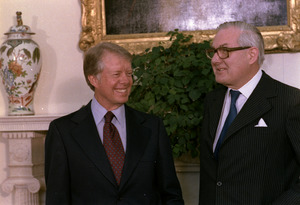
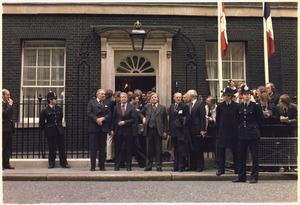
During his first year in office, Callaghan started what has since become known as 'The Great Debate', when he spoke at Ruskin College, Oxford about the 'legitimate concerns' of a public about education as it took place in the nation's maintained schools. This discussion led to greater involvement of the government, through its ministries, in the curriculum and administration of state education, leading to the eventual introduction of the National Curriculum some ten years later. Early in his premiership he caused controversy with the appointment of Peter Jay, his then son-in-law as the British Ambassador to the United States.
Callaghan's time as Prime Minister was dominated by the troubles in running a Government with a minority in the House of Commons: he was forced to make deals with minor parties to survive – including the Lib–Lab pact, and he had been forced to accept a referendum on devolution in Scotland as well as one in Wales (the former went in favour but did not reach the required majority, and the latter went heavily against). He also became prime minister at a time when Britain was suffering from double-digit percentage inflation and rising unemployment. He responded to the economic crises by adopting deflationary policies to reduce inflation, and cutting public expenditure – a precursor to the monetarist economic policies that the next government, a Conservative one led by Margaret Thatcher, would pursue to ease the crises.
Despite the economic difficulties faced by the government, over the summer of 1978 (shortly after the end of the Lib-Lab pact) most opinion polls showed Labour ahead, and the expectation grew that Callaghan would call an autumn election that would have given him a second term in office until autumn 1983. The economy had also started to show signs of recovery by this time. 1978 was a year of economic recovery for Britain, with inflation falling to single digits, unemployment declining during the year, and general living standards going up by more than 8%. Famously, he strung along the opposition and was expected to make his declaration of election in a broadcast on 7 September 1978. His decision to put off the election, at the time, seen by many as a sign of his domination of the political scene and he ridiculed his opponents by singing old-time music hall star Vesta Victoria's song "Waiting at the Church" at that month's Trades Union Congress meeting: now seen as one of the greatest moments of hubris in modern British politics, but celebrated at the time. Callaghan intended to convey the message that he had not promised an election, but most observers misread his message as an assertion that he would call an election, and the Conservatives would not be ready for it.
"Winter of Discontent"
Callaghan's method of dealing with the long-term economic difficulties involved pay restraint which had been operating for four years with reasonable success. He gambled that a fifth year would further improve the economy and allow him to be re-elected in 1979, and so attempted to hold pay rises to 5% or less. The trade unions rejected continued pay restraint and in a succession of strikes over the winter of 1978–79 (known as the Winter of Discontent) secured higher pay. The industrial unrest made his government extremely unpopular, and Callaghan's response to one interview question only made it worse. Returning to the United Kingdom from an economic summit held in Guadeloupe in early 1979, Callaghan was asked, "What is your general approach, in view of the mounting chaos in the country at the moment?" Callaghan replied, "Well, that's a judgement that you are making. I promise you that if you look at it from outside, and perhaps you're taking rather a parochial view at the moment, I don't think that other people in the world would share the view that there is mounting chaos." This reply was reported in The Sun under the headline "Crisis? What Crisis?". Callaghan also later admitted in regard to the Winter of Discontent that he had "let the country down".
The Winter of Discontent saw Labour's performance in the opinion polls slump dramatically. They had topped most of the pre-winter opinion polls by several points, but in February 1979 at least one opinion poll was showing the Tories 20 points ahead of Labour and it appeared certain that Labour would lose the forthcoming election.
In the buildup to the election, the Daily Mirror and The Guardian supported Labour, while The Sun, the Daily Mail, the Daily Express, and The Daily Telegraph supported the Conservatives.
On 28 March 1979, the House of Commons passed a Motion of No Confidence by one vote, 311–310, which forced Callaghan to call a general election that was held on 3 May. The Conservatives under Margaret Thatcher ran a campaign on the slogan "Labour Isn't Working" and won the election.
Callaghan's failure to call an election during 1978 was widely seen as a political miscalculation; indeed, he himself later admitted that not calling an election was an error of judgement. However, private polling by the Labour Party in the autumn of 1978 had shown the two main parties with about the same level of support. After losing power in 1979, Labour would spend the next 18 years in opposition.
Historians Alan Sked and Chris Cook have summarized the general consensus of historians regarding Labour in power in the 1970s:
Resignation, backbenches and retirement
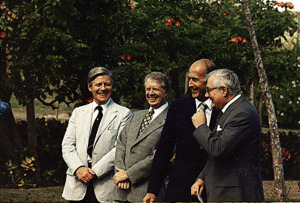
From left: Helmut Schmidt, Jimmy Carter, Valéry Giscard d'Estaing and Callaghan.
Notwithstanding electoral defeat, Callaghan stayed on as Labour leader until 15 October 1980, shortly after the party conference had voted for a new system of election by electoral college involving the individual members and trade unions. His resignation ensured that his successor would be elected by MPs only. After a campaign that laid bare the deep internal divisions of the Parliamentary Labour Party, Michael Foot narrowly beat Denis Healey on 10 November in the second round of the election to succeed Callaghan as leader. Foot had been a relatively late entrant to the contest and his decision to stand ended the chances of Peter Shore.
In 1982, along with his friend Gerald Ford, he co-founded the annual AEI World Forum.
In 1983, he attacked Labour's plans to reduce defence, and the same year became Father of the House as the longest continuously serving member of the Commons.
In 1987, he was made a Knight of the Garter and stood down at the 1987 general election after 42 years as a member of the Commons. Shortly afterwards, he was elevated to the House of Lords as Baron Callaghan of Cardiff, of the City of Cardiff in the Royal County of South Glamorganshire. In 1987, his autobiography, Time and Chance, was published. He also served as a non-executive director of the Bank of Wales.
His wife, Audrey, a former chairman (1969–82) of Great Ormond Street Hospital, spotted a letter to a newspaper which pointed out that the copyright of Peter Pan, which had been assigned by J. M. Barrie to the hospital, was going to expire at the end of that year, 1987 (50 years after Barrie's death, the current copyright term). In 1988, Callaghan moved an amendment to the Copyright Designs & Patents Act, then under consideration in the House of Lords, to grant the hospital a right to royalty in perpetuity despite the lapse of copyright, and it was passed by the government.
In July 1996, he was awarded an honorary degree from the Open University as Doctor of the University.
In an interview broadcast on the BBC 4 radio program The Human Button, Callaghan became the only prime minister to go on record as saying he would have ordered nuclear retaliation in the event of a nuclear attack on the United Kingdom:
If it were to become necessary or vital, it would have meant the deterrent had failed, because the value of the nuclear weapon is frankly only as a deterrent," he said. "But if we had got to that point, where it was, I felt, necessary to do it, then I would have done it. I've had terrible doubts, of course, about this. I say to you, if I had lived after having pressed that button, I could never, ever have forgiven myself.
In October 1999, Callaghan told The Oldie Magazine that he would not be surprised to be considered as Britain's worst prime minister in 200 years. He also admitted in this interview that he "must carry the can" for the Winter of Discontent.
Personal life
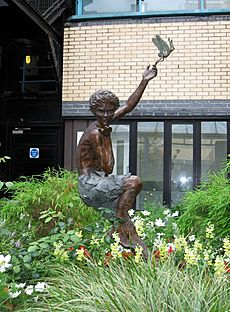
Callaghan's interests included rugby (he played lock for Streatham RFC before the Second World War), tennis and agriculture. He married Audrey Elizabeth Moulton, whom he had met when they both worked as Sunday School teachers at the local Baptist church, in July 1938 and had three children – one son and two daughters.
- Margaret, Baroness Jay of Paddington
- Julia, who married Ian Hamilton Hubbard and settled in Lancashire
- Michael, who married Julia Morris and settled in Essex.
Although there is much doubt about how much belief Callaghan retained into adult life, the Baptist nonconformist ethic was a profound influence throughout all of his public and private life. According to InfoBritain, Callaghan slowly became an atheist while working with the Inland Revenue union.
One of his final public appearances came on 29 April 2002, when at the age of 90 he sat alongside the then prime minister Tony Blair and the three other surviving former prime ministers at the time at Buckingham Palace for a dinner which formed part of the celebrations for the Golden Jubilee of Elizabeth II, alongside his daughter Margaret, Baroness Jay, who had served as Leader of the House of Lords from 1998 to 2001.
Callaghan died on 26 March 2005 at Ringmer, East Sussex, of lobar pneumonia, cardiac failure and kidney failure. He died one day before what would have been his 93rd birthday and 11 days after his wife died. He died as the longest-lived British former prime minister, having beaten Harold Macmillan's record 39 days earlier. Lord Callaghan was cremated and his ashes were scattered in a flower bed around the base of the Peter Pan statue near the entrance of London's Great Ormond Street Hospital, where his wife had formerly been chair of the board of governors.
Historiography
After four decades, the historiography on him is still contested territory. The left wing of the Labour Party considers him a traitor whose betrayals of true socialism laid the foundations for Thatcherism. They point to his decision in 1976 to allow the International Monetary Fund to control the government budget. They accuse him of abandoning the traditional Labour commitment to full employment. They blame his rigorous pursuit of a policy of controlling income growth for the "Winter of Discontent". Writers on the right of the Labour Party complained that he was a weak leader who was unable to stand up to the left. The "New Labour" writers who admire Tony Blair identify him with the old-style partisanship that was a dead end, which a new generation of modernisers had to repudiate. Practically all commentators agree that Callaghan made a serious mistake by not calling an election in the autumn of 1978. Bernard Donoughue, a senior official in his government, depicts Callaghan as a strong and efficient administrator who stood heads above his predecessor Harold Wilson. The standard scholarly biography by Kenneth Morgan is generally favourable – at least for the middle of his premiership – while admitting failures at the beginning, at the end, and in his leadership role after Thatcher's victory. The treatment found in most textbooks and surveys of the period remains largely negative.
In popular culture
The song "Time for Truth" from The Jam's debut album, In the City, a scathing critique of the state of the British nation, directly addresses Callaghan: "I think it's time for truth, and the truth is you lost, Uncle Jimmy."
The Callaghan Library at Ruskin College, Oxford is named after Callaghan. The library was opened in 2011: the ceremony was attended by James Callaghan's son Michael and grandson Joe, the latter being a student at the college.
The vote of no confidence that led to the 1979 general election is a plot point in the first episode of the second series of Utopia.
Titles from birth to death
- Mr James Callaghan (27 March 1912 – 1943)
- Lieutenant James Callaghan, RNVR (1943 – 26 July 1945)
- Lieutenant James Callaghan, MP (26 July 1945 – 21 October 1964)
- Lieutenant The Right Honourable James Callaghan, MP (21 October 1964 – ?)
- The Right Honourable James Callaghan, MP (? – 23 April 1987)
- The Right Honourable Sir James Callaghan, KG, MP (23 April 1987 – 11 June 1987)
- The Right Honourable Sir James Callaghan, KG (11 June 1987 – 5 November 1987)
- The Right Honourable The Lord Callaghan of Cardiff, KG, PC (5 November 1987 – 26 March 2005)
Arms
Images for kids
-
Callaghan (second left) with finance ministers in The Hague, 1966
-
Callaghan in 1970 (left), with Prime Minister of Northern Ireland James Chichester-Clark
-
Callaghan and Dutch foreign minister Max van der Stoel in 1975
-
Callaghan (right) with US president Jimmy Carter in 1978
-
Callaghan (right) with Helmut Schmidt, Jimmy Carter and Valéry Giscard d'Estaing in Guadeloupe, 1979
-
Callaghan's ashes were scattered in the flowerbed around the Peter Pan statue (pictured in 2008) at London's Great Ormond Street Hospital
See also
 In Spanish: James Callaghan para niños
In Spanish: James Callaghan para niños


